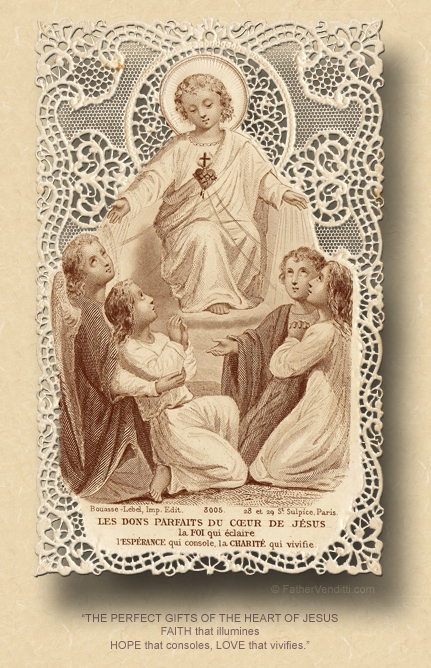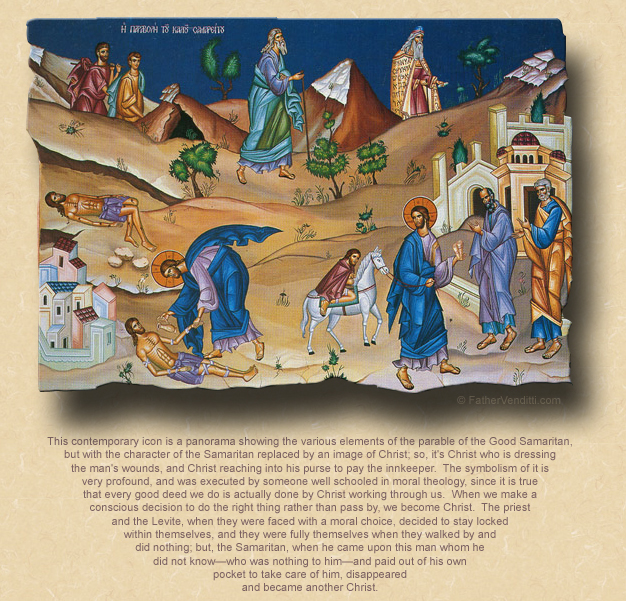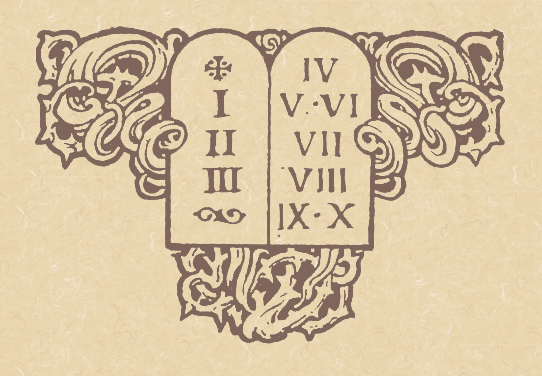Secret Decoder Ring Not Included.
The Fifteenth Sunday of Ordinary Time.
Lessons from the tertiary dominica, according to the ordinary form of the Roman Rite:
• Deuteronomy 30: 10-14.
• Psalm 69: 14, 17, 30-31, 33-34, 36-37.
[or Psalm 19: 8-11.]
• Colossians 1: 15-20.
• Luke 10: 25-37.
The Fifth Sunday after Pentecost.
Lessons from the dominica, according to the extraordinary form of the Roman Rite:
• I Peter 3: 8-15.
• Psalm 86: 10, 9.
• Matthew 5: 20-24.
FatherVenditti.com
|
 9:27 PM 7/13/2019 — The parable of the good Samaritan is so familiar to us that we might be tempted to think it has nothing new to teach us. A rabbi asks our Lord what he must do to be saved. In the translation employed by the Roman Missal, Saint Luke calls him “a scholar of the law”—other translations will often use the word “lawyer”—which, in New Testament times, was what a rabbi was: someone learned in the Law of Moses. There's no reason to suppose his question is not a sincere one and, like any good rabbi Himself, Jesus answers his question with a question: What is written in the law? What does the law of Moses say is required for salvation? It's a very easy question for this man to answer since the Book of Deuteronomy is quite clear and simple on this point: love God above all else, and love your neighbor as yourself (cf. Deut. 6: 5). And our Lord is just as simple and straight forward: “'Thou hast answered right,' he told him; 'do this, and thou shalt find life'” (Luke 10: 28 Knox). 9:27 PM 7/13/2019 — The parable of the good Samaritan is so familiar to us that we might be tempted to think it has nothing new to teach us. A rabbi asks our Lord what he must do to be saved. In the translation employed by the Roman Missal, Saint Luke calls him “a scholar of the law”—other translations will often use the word “lawyer”—which, in New Testament times, was what a rabbi was: someone learned in the Law of Moses. There's no reason to suppose his question is not a sincere one and, like any good rabbi Himself, Jesus answers his question with a question: What is written in the law? What does the law of Moses say is required for salvation? It's a very easy question for this man to answer since the Book of Deuteronomy is quite clear and simple on this point: love God above all else, and love your neighbor as yourself (cf. Deut. 6: 5). And our Lord is just as simple and straight forward: “'Thou hast answered right,' he told him; 'do this, and thou shalt find life'” (Luke 10: 28 Knox).
What's most important in this little dialogue that serves as a prologue to the parable is not so much the rabbi's question, nor even our Blessed Lord's answer, but the reason our Lord's rather obvious answer doesn't satisfy the rabbi. Saint Luke says it's because “he wanted to justify himself” (cf. v. 29), whatever that means. In point of fact, by answering the rabbi's question with a question, what our Lord has done here is maneuvered this man, in classic rabbinical style, into answering his own question; but then, something goes wrong. For whatever reason, the simple idea that what the Law of Moses says is exactly what it means doesn't satisfy this man, and he finds himself colliding with what we could call—for those of you who studied physics—the Occam's Razor of the Bible, that what it seems to say is exactly what it says, and you don't need a theologian or a secret decoder ring to decipher it; and so, he decides to open up Pandora's Box by asking the very delicate and provocative follow-up question: “And who is my neighbor?” (v. 28 Knox), a loaded question if ever there was one. Why? Well, take into account the man and his time.

Sumeria (or Samaria, depending on your translation) was part of the old “Upper Kingdom” of Israel. If you look in your Bible you might find some maps showing what was where in Biblical times; and, if there are any that show Palestine in Old Testament times, you'll find one that shows what it calls the “Upper Kingdom” and the “Lower Kingdom.” The original twelve tribes of Israel suffered a kind of civil war, with the largest and most powerful of them, the tribe of Judah, separating from the rest and moving south, and building a capitol at the old village of Jerusalem. The remaining tribes stayed in the North; they had no capitol, they had no government; they called themselves the kingdom of Israel, but had no unity, and it wasn’t too long before they were conquered—by the Syrians, by the Babylonians, by all kinds of people—the result being that their religion and culture became polluted. They considered themselves Jews, but the Judeans did not recognize them as such. The Judeans had built a Temple in Jerusalem, but they wouldn’t let the Israelites of the old upper kingdom go there; so they built their own temple on the mountain of Gerizim, near the ancient city of Sychar, in the region known as Sumeria; and, before too long, they started referring to themselves as Sumeritans, at which point the Judeans co-opted the title of Israelite for themselves. And while the Sumeritans never stopped thinking of themselves as true Jews, the Judeans regarded them as little more than pious pagans. Remember that Jesus, Himself, in Matthew’s Gospel, when He first sends the disciples out to preach, tells them not to preach to the Sumeritans.
This is the reason that the rabbi's question, “Who is my neighbor?” is such a loaded question, and why our Lord's choice of making the hero of His story a Sumeritan, a member of a race of people hated by the Jews, was so significant. Notice that, after the story is over, when our Lord asks the rabbi which character acted as a real neighbor, the rabbi so hates the Sumeritans that he tries to skirt the issue with a euphemism by saying, “The one who treated him with mercy" (v. 37 RM3). He can't even bring himself to say the word, "Sumeritan," so filled with animosity is he for these people.
What I would ask you to reflect upon today is the fact that the rabbi wouldn't have gotten himself into this embarrassing situation if he had accepted the simplicity of our Lord's answer in the first place. We, of course, are thankful that he didn't, otherwise our Lord wouldn't have told this beautiful little story, but the original answer given by our Lord should have been enough: "What must I do to be saved?"
"What does the law of Moses say?"
"Well, the law of Moses says this?”
"OK, go and do that, then.” But for this man, who thinks himself smart, it's too simple. He's looking for something profound; he's looking for something intricate and elegant; he's looking for something that can be picked apart and studied. And how often we are just like this man!
 My guess is that when the rabbi asks Jesus, "Who is my neighbor?" he already knows the answer. But he doesn't like that answer, so he asks our Lord anyway, hoping that our Lord will say something so complicated and convoluted that he will be able to twist it around in his own mind to mean something completely different, something easier for him to live with. Of course, that doesn't happen. Our Lord sticks to His guns, makes his point even more clearly in the story that He tells; and so the man is stuck with an answer he doesn't want, but which is nonetheless true. And it's exactly in this way that we so often imitate this rabbi. How many people are there, do you suppose, having some personal problem with the teaching of the Church—whether it’s about the Church’s teaching on morality, or our liturgical obligations, or fasting on the appointed days, or whatever; it doesn’t matter what—who will shop around and talk to four or five priests until they find one who will tell them what they want to hear? It’s not hard: there are all kinds of priests floating around out there who will tell you whatever you want. Just like the rabbi in the Gospel. He knows exactly who his neighbor is. There's no ambiguity about it. He knows exactly what it means. But he doesn't like what it means; so he asks, "Well, who exactly is my neighbor?" thinking that if he asks the question in a different way, he'll get a different answer, an answer that he can play with. Our Lord sees through his hypocrisy, and hits him right between the eyes by telling him a story that drives home the point even more forcefully, by setting up as an example of brotherly love a man whom the rabbi has been taught from childhood to hate. My guess is that when the rabbi asks Jesus, "Who is my neighbor?" he already knows the answer. But he doesn't like that answer, so he asks our Lord anyway, hoping that our Lord will say something so complicated and convoluted that he will be able to twist it around in his own mind to mean something completely different, something easier for him to live with. Of course, that doesn't happen. Our Lord sticks to His guns, makes his point even more clearly in the story that He tells; and so the man is stuck with an answer he doesn't want, but which is nonetheless true. And it's exactly in this way that we so often imitate this rabbi. How many people are there, do you suppose, having some personal problem with the teaching of the Church—whether it’s about the Church’s teaching on morality, or our liturgical obligations, or fasting on the appointed days, or whatever; it doesn’t matter what—who will shop around and talk to four or five priests until they find one who will tell them what they want to hear? It’s not hard: there are all kinds of priests floating around out there who will tell you whatever you want. Just like the rabbi in the Gospel. He knows exactly who his neighbor is. There's no ambiguity about it. He knows exactly what it means. But he doesn't like what it means; so he asks, "Well, who exactly is my neighbor?" thinking that if he asks the question in a different way, he'll get a different answer, an answer that he can play with. Our Lord sees through his hypocrisy, and hits him right between the eyes by telling him a story that drives home the point even more forcefully, by setting up as an example of brotherly love a man whom the rabbi has been taught from childhood to hate.
Before He ascended into heaven, our Lord entrusted His Church to His apostles and their successors, and charged them to teach what was necessary for salvation in His name. He imparted to them the Holy Spirit, so that when they teach in His name they cannot teach error. There will be times—for some more than for others—when we will not like what they teach. When that happens, we have to make a choice: we can waste our time looking for clever and convoluted ways to get around what they teach; or we can set our eyes on heaven and resolve to make the sacrifices necessary for salvation, confident that, even if we fail from time to time, we can confess our sins and start again as many times as we have to, just so long as we don't try to fool ourselves.
The teachings of our Lord and His Church are not complicated. They do not require a degree in Canon Law to figure out. They do require a soul imbued with a spirit of humility and the virtues of Faith and Hope, trusting that the Lord's promises will always be fulfilled.

|

